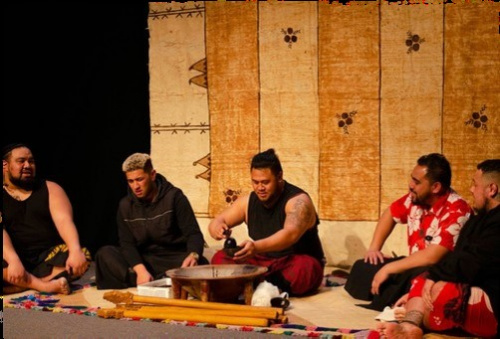PALU
BATS Theatre, The Heyday Dome, 1 Kent Tce, Wellington
05/06/2019 - 08/06/2019
Production Details
Come, fai kava, fai ava, talanoa with Y|NOT as young poly men endeavour to make meaningful connections with each other culturally. Where our common ground is the realm of sharing, understanding and acceptance. Woven together with folk songs of old Polynesia.
Y|NOT are young Pasifika artists who just want to CREATE work, share some stories, and get in on some action. I mean… why not?
Featuring: Jake Arona, Maxwell Siulangapo, Mana Tatafu, Albany Peseta, Taniela Lealatoa & Champ Betham.
Music from: Toa Siulangapo, Pua Siulangapo
BATS Theatre The Heyday Dome
5 – 8 June 2019
9:30pm
Full Price $20
Concession Price $15
Group 6+ $14
Kia Mau
BOOK TICKETS
Accessibility
*Access to The Heyday Dome is via stairs, so please contact the BATS Box Office at least 24 hours in advance if you have accessibility requirements so that appropriate arrangements can be made. Read more about accessibility at BATS.
Theatre , Music , Dance-theatre ,
50 mins
Expert weavers of stories of old and now
Review by Salote Cama 06th Jun 2019
The Christchurch-based Y|NOT COLLECTIVE is holding court at BATS’ Heyday Dome theatre produced by Susi Sagapolutele-Afitu, and featuring Jake Arona, Maxwell Siulangapo, Mana Tatafu, Albany Peseta, Taniela Lealatoa and Champ Betham with music from Toa Siulangapo and Pua Siulangapo as part of the 2019 Kia Mau festival. Palu is a celebration of the rituals of kava – old and new.
The rituals start before the audience is seated. The powdered root of the Piper methysticum and water is being mixed and in turn strained through a cloth as the audience file in. The set is a beautiful piece of ngatu (tapa cloth) and a tanoa (kava bowl), and Toa and Pua Siulangapo play a beautiful melody. Outside, the dregs of a weather system means that Wellington’s cold and windy reputation is intact but inside the atmosphere is already warm – and, for a lot of the audience, familiar and the rest of the audience welcoming.
Jake Arona is seated in the middle, in charge of the tanoa and of the audience. He directs the audience’s attention to where they need to be, playing off the other actors. He slips easily between delivering comedic quips and one liners into being a commanding story teller, sometimes even within the same sentence. He is able to communicate complex social dynamics in a way that does not over simplify but still is understandable. Arona, simply put, is able to take audiences on a ride.
Albany Peseta’s entrance is one of the many comedic highlights of the show. This chaotic energy he brings in, whether it is by a facial expression that catches people off-guard, his comedic timing or his velvet smooth interpretation of a Motown classic, is fun to watch. The choices Peseta makes – namely the way he chooses to sit – pays off and makes the character all the more lived in and identifiable.
Maxwell Siulangapo has many comedic moments of shine throughout Palu, but these are only elevated when you look at how it plays against the more dramatic aspects of his performance. There is a scene that tells the story of how Kava came to Tonga in which Siulangapo plays a farmer. This scene is brief and tragic but Siulangapo lives in it, allowing the pain and the duty to wash over him.
Mana Tatafu, with his Mate Ma’a Tonga hoodie, is a well versed story teller. He is the anchor that grounds the performance as a whole, both with his deft delivery and with the bass notes when Y|NOT sings folk songs and The Temptations with their tight vocal harmony. Tatafu’s performance during the Game scene highlights his versatility and ability to play off his cast mates.
Palu is an experience that is woven in front of you. Y|NOT weaves the story with ngatu, with lavalava, with a Toa Samoa vs Mate Ma’a Tonga match, with stories and rituals of old, with stories and rituals of now, with hopes, with disappointments. They are expert weavers of stories, with kava to share.
Copyright © in the review belongs to the reviewer





Comments
Margaret Austin June 6th, 2019
Notable for its exuberance, Palu is an informative and entertaining way to introduce a palangi like me to Samoan and Tongan culture.
The stage is filled with half a dozen muscular, male Pasifika bodies. There are also two women, who are providing music. The central performer presides over a large bowl of kava and he ladles it out at regular intervals – both as an acknowledgement and as a reward.
We get to hear the history of kava, references to the Tongan and Samoan background of our performers, and the situation of an ‘afikasi’. There’s lots of humour here, and it’s all good-natured. Even better, we get to hear singing – in three languages – that’s lovely and lusty. It doesn’t matter that I’m probably the only one not to understand the words.